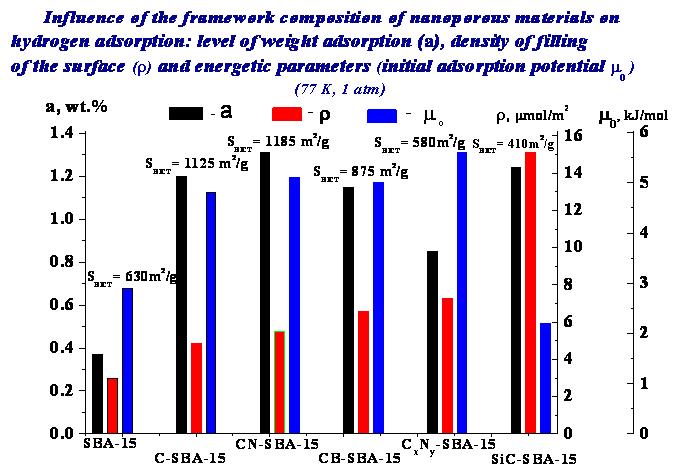|
|
On the most important:
|
Science reporting session

|

Abstracts 2011

Abstracts 2012

Abstracts 2013

Abstracts 2014
|

He main directions of development of hydrogen energy (review)

Hydrogen energy: storage and transportation of hydrogen (review)
|

Monograph.
Basic problem of hydrogen energy.
|
|
|
|
|
Carbon based nanoporous materials for hydrogen storage technologies

Area of applications
It is supposed to use the investigated methods of synthesis of nanoporous carbons and the effects of modification of their porous structure and adsorption capacity for hydrogen to create practically and economically reasonable hydrogen absorbents and accumulators.
Brief description
Methods of synthesis of new nanoporous element-containing (N, B, P) carbon and carbon-silica materials, research of the influence of synthesis conditions and subsequent modification (thermal treatment with steam etc.) on the parameters of their porous structure and adsorption capacity (energy, specific adsorption, etc.) to hydrogen.
Expected results
Increasing of hydrogen adsorption up to 6% wt. and more (at T = 77 K, p ≥ 20 atm) and decreasing of the pressure of hydrogen storage.
Advantages
Using the applied methods of synthesis and modification of nanoporous carbons, which provide a combination of high porosity (micropore and narrow mesopore volume) and the formation of additional element-containing centers of polarization on the surface will result in a significant increase in their adsorption capacity for hydrogen and decrease of the pressure of hydrogen storage.
Competitors
School of Chemistry,
UniVersity of Nottingham,
UniVersity Park,
Nottingham NG7 2RD,
U.K.BASF AG
Project development
The methods of synthesis of nanoporous element-containing (N, B, P) carbon and carbon-silica materials, carbon nitride and silicon carbide are developed, the effect of synthesis conditions and subsequent modification (thermal treatment with steam, etc.) on the parameters of their porous structure and adsorption capacity for hydrogen is investigated, nanoporous samples of carbon nitride and silicon carbide with high specific hydrogen adsorption (up to 15 μmo l/m2, 1.2 wt.% for SiC samples with specific surface area of 400 m2/g) and carbon samples with high specific surface area (up to 2300 m2/g) and adsorption capacity for hydrogen (up to 2 wt.% at T = 77 K and p = 1 atm) are obtained.
Intellectual property
Applying for a patent is supposed after optimization of the used methods of synthesis and modification towards creating of nanoporous carbons with high porosity and specific surface to hydrogen, as well as testing of their adsorption capacity for hydrogen in conditions close to practical application (p ≥ 20 atm, etc.).
Contact information
Executor:
L. Pisarzhevsky Institute of Physical Chemistry National Academy of Sciences of Ukraine
Project №30 “Nanocomposite porous materials on the basis of titania and carbon for technologies of the use and accumulation of hydrogen”
Contact person:
Yaremov Pavel S.
Tel. tel. +38(044)-525-67-71
Е-mail: yaremovp@ukr.net
|

